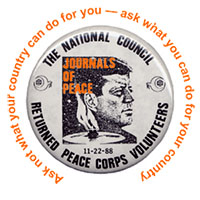RPCVs and the Journals of Peace – November, 1988
This Thanksgiving we are remembering how President Kennedy first inspired Peace Corps Volunteers. RPCVs honored his memory at the 25th commeneration of the tragic assassination, by telling about how he inspired them. Every three minutes for 24 hours, a RPCV spoke at the Capital Rotunda. Read the story of that vigil, again, here.https://peacecorpsworldwide.org/the-journals-of-peace-capital-rotrunda-november-21-1988/
and here: https://peacecorpsworldwide.org/rpcvs-remember/
On the original site of Peace Corps Writers, Marian Haley Beil archived a partial list of RPCVs who spoke at the Capital Rotunda in the Peace Corps’ Commeneration of President Kennedy. Here is that list, click on the highlighted names to read some of the stories; http://peacecorpswriters.org/pages/depts/archives/journalsofpeace/jpalphalst.html
If you spoke and your name is not listed, please add it in the comment section.
Three of those stories by RPCVs Gary Russell, Karin Schumacher, and Dennis Kaltreider were posted on this site. We will repost each one. Here is the first:

Journals of Peace
Gary P. Russell (Ecuador 1978-81)
Monday, November 21
7:18 pm
To this day, my Peace Corps experience remains the most influential and rewarding time of my life. For this, I have you to thank JFK. In forming the Peace Corps, you championed a concept that captured the best in humanity. You gave me and other Americans a unique opportunity to work with other citizens of the world in the pursuit of economic and social development and world peace. Twenty-seven years after its enactment, the Peace Corps is alive and well; its work valued by political leaders at home and aboard.
As a child I remember being attracted to the commercials that asked Americans to join the Corps. Even then, as an average run of the mill kid, I was fascinated by the concept, though at the time I never really gave much thought to joining as an adult.
I entered the Peace Corps immediately after college. At the time I was 22, had never traveled outside the U.S., did not speak a foreign language, and possessed no technical skills. But despite my seemingly poor resume, the Peace Corps, either by mistake or out of pity, accepted me. I was sent to the frontier of the Amazon Jungle in Ecuador, South America to work as a land surveyor for the Shuar Indians, an indigenous group, whose land was being taken away by Ecuadorians who were moving to the jungle in search of prosperity.
In this new and completely foreign environment I was scared. There were so many unknowns and I was so naïve. As is the case with many Volunteers, I’m sure, the obstacles at first seemed insurmountable: I had to learn a new trade and a foreign language along with a new set of customs and norms; I had to earn the trust and respect of the Indians with whom I worked and the Ecuadorians with whom I lived; and I had to deal with loneliness and isolation and continuous bouts of intestinal sickness.
But for whatever reason, be it pride or determination, I overcame most of the hurdles. I didn’t soar above any of them, but through the experience, others gained a bit. A few hundred people in the Amazon jungle now have legal title to their land.
As for me, much of my surprise, I was the one who gained the most from the experience. I returned to the U.S. with a bag of riches filled with enduring friendships abroad; a special bond with other Volunteers; an appreciation for the problems plaguing the less developed countries of the world, along with an even greater appreciation for the wealth this country is blessed; and a desire to continue to try and promote in this country, in some way, the noble ideals embodies in the Peace Corps. In that sense, the Peace Corps experience continued for me at home in the States.
For the profoundly positive impact the Peace Corps has had on me life, I thank you JFK
A MAN STARTS OUT
as a traveler, suddenly becomes a hod-carrier,
and is then transformed into a lighthouse,
crystallizing the blank in his mind where
the key note of sincerity is a mainspring drifting
down the sands of time on flowery beds of ease
until he hears an explosion going down the street
and he remembers his umbrella.
How does he meet this menace
if he does not retreat
if he does not run away
nor withdraw until the guilty are punished?
He does not meet anything. He is absorbed.
A man starts out in the presence of cats as if
he were peeking through graceful pink blooms
blossoming out of standard deviations
to quickly fall from their dazzling sunset glories
while still broadcasting petals of desire
floating down memories’ lane still lank, lovely
as a gauntlet of roses — and it’s like being
attacked and embellished in the act paged-backward
into irregular pearl that even if those lies
lack luster they are good crutches
for the oblique moment when
a man starts out.
© COPYRIGHT Edward Mycue